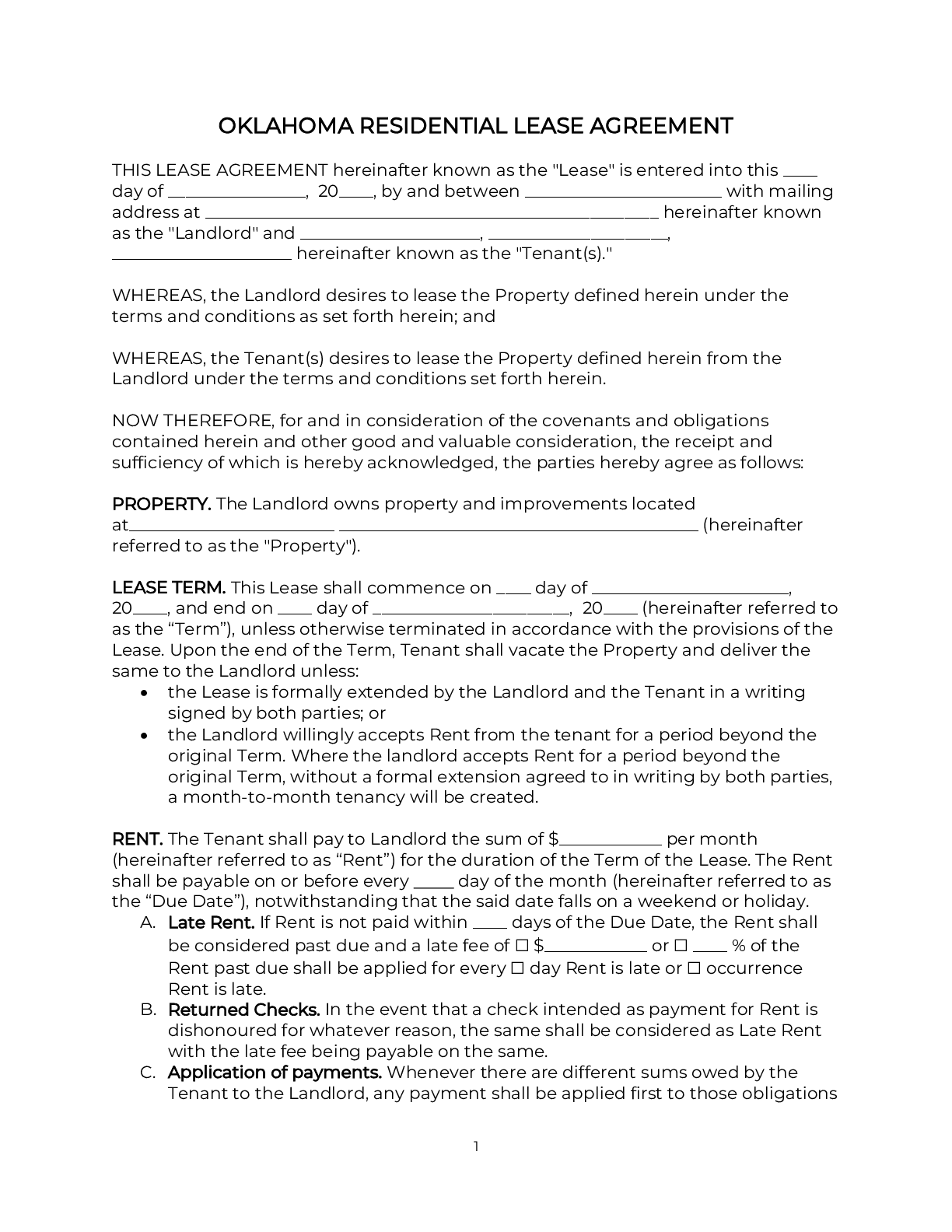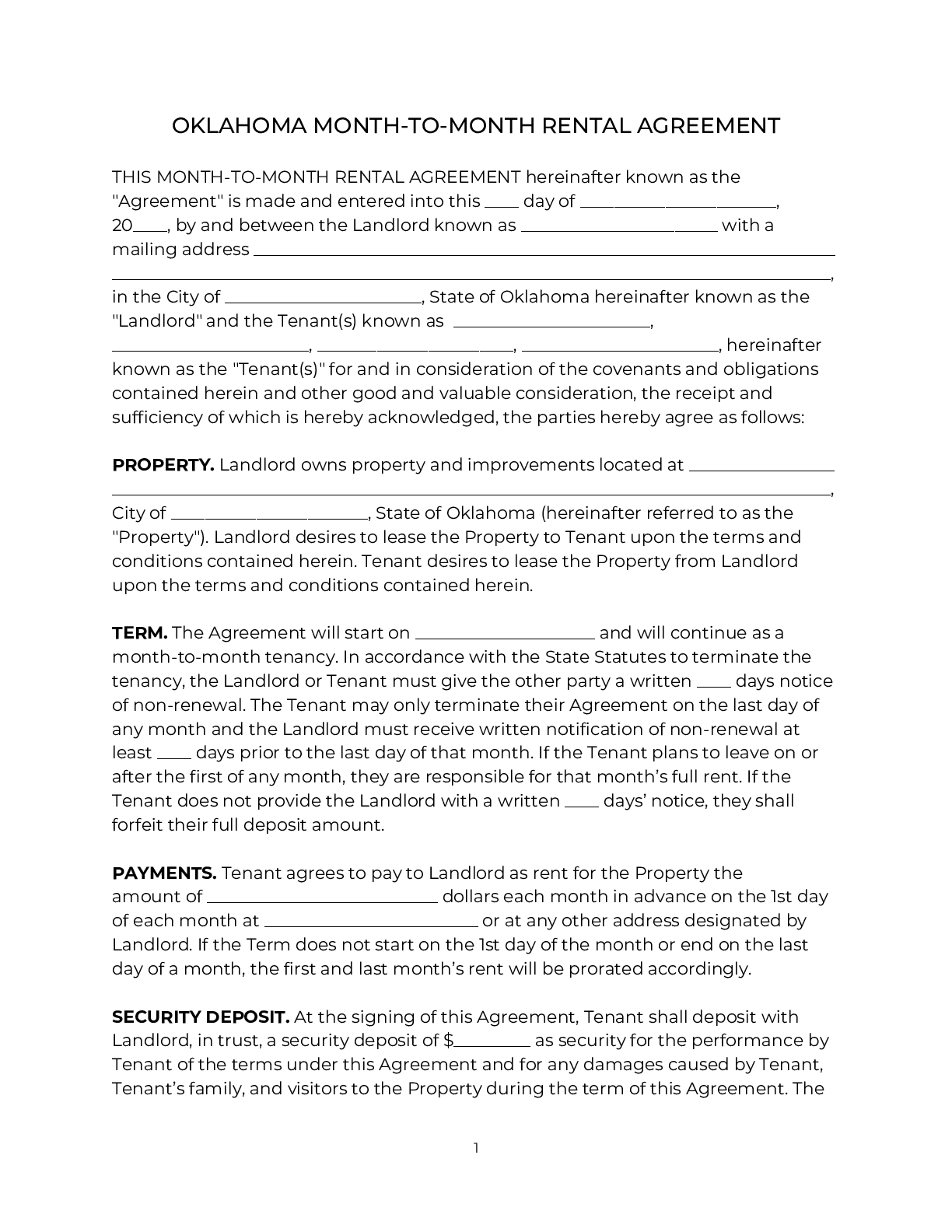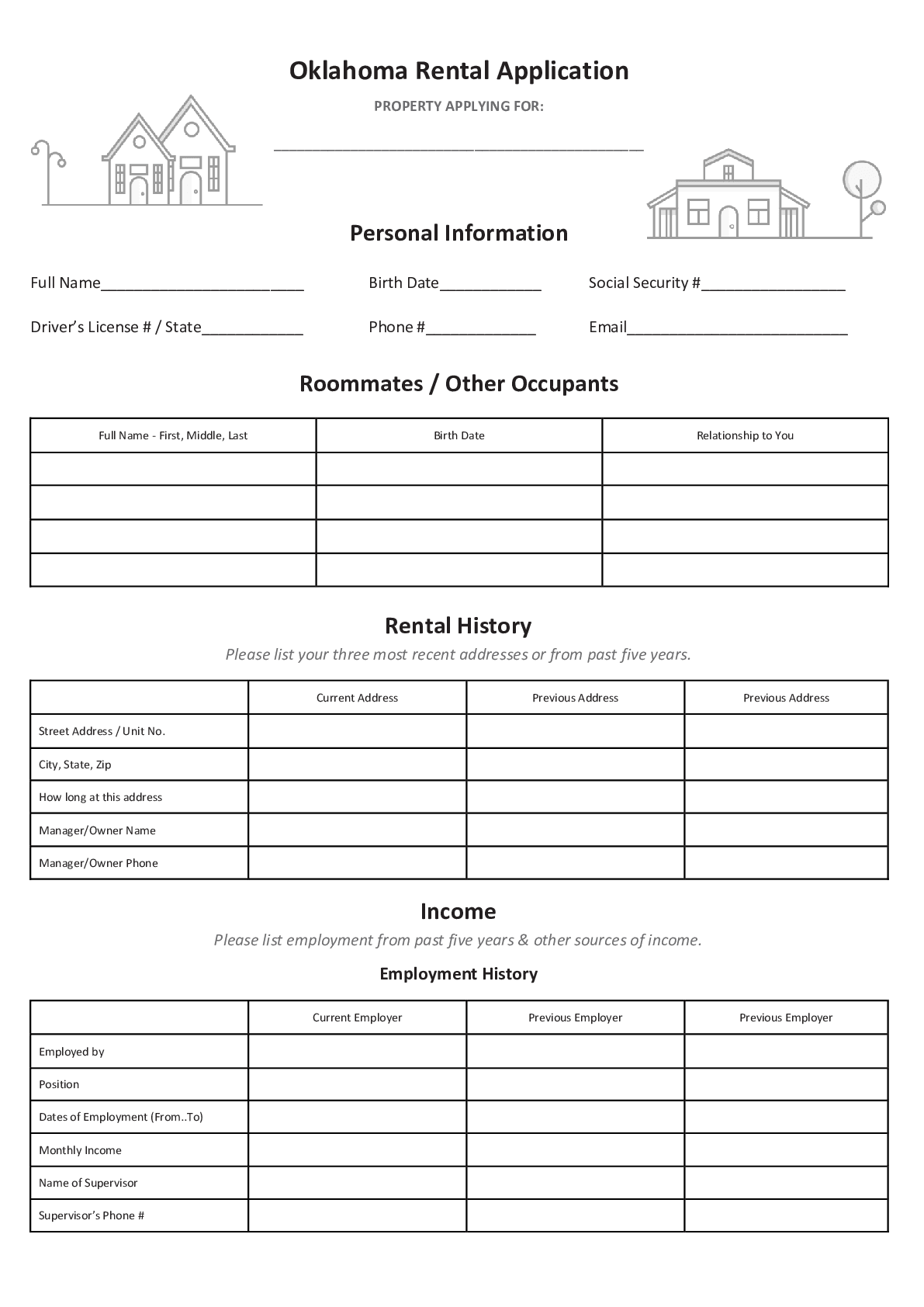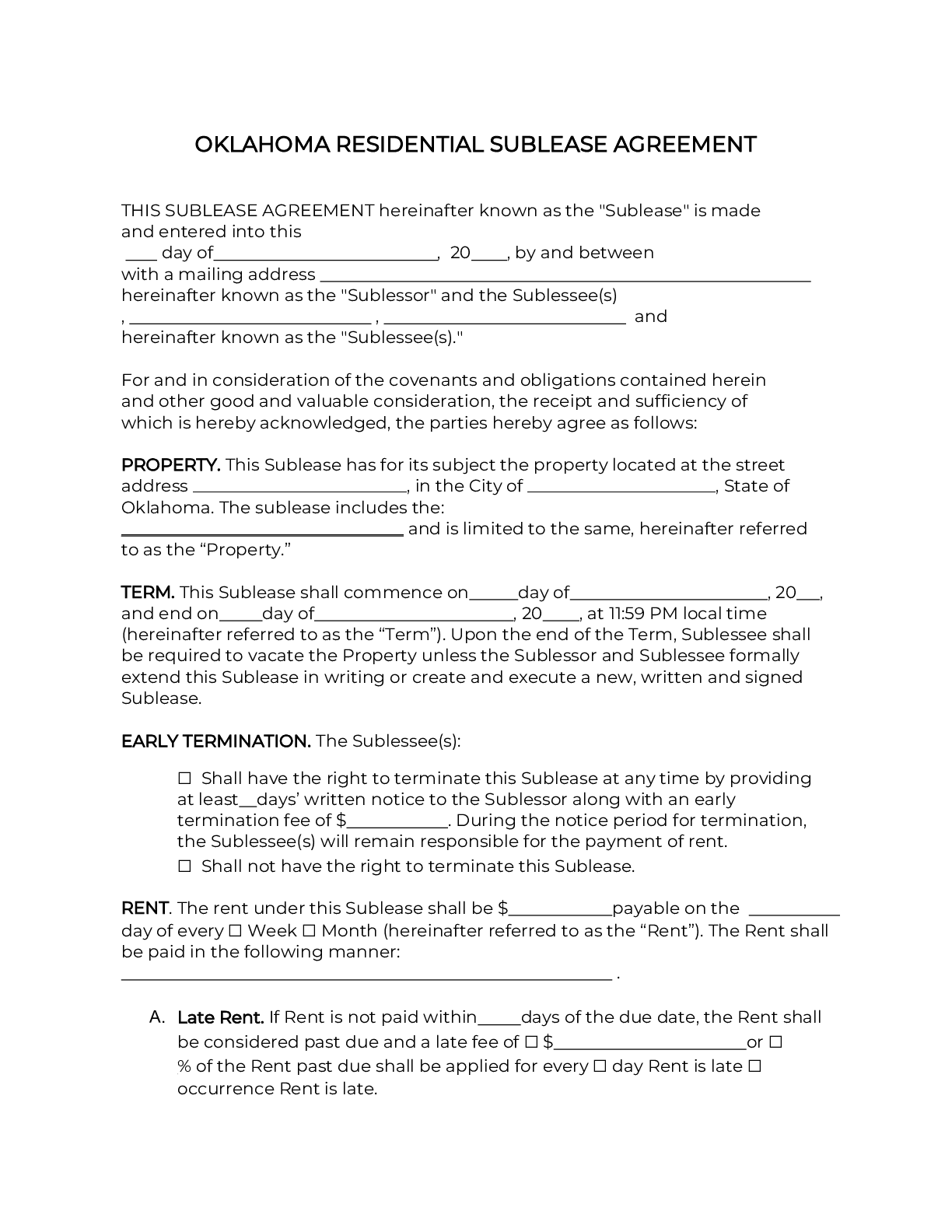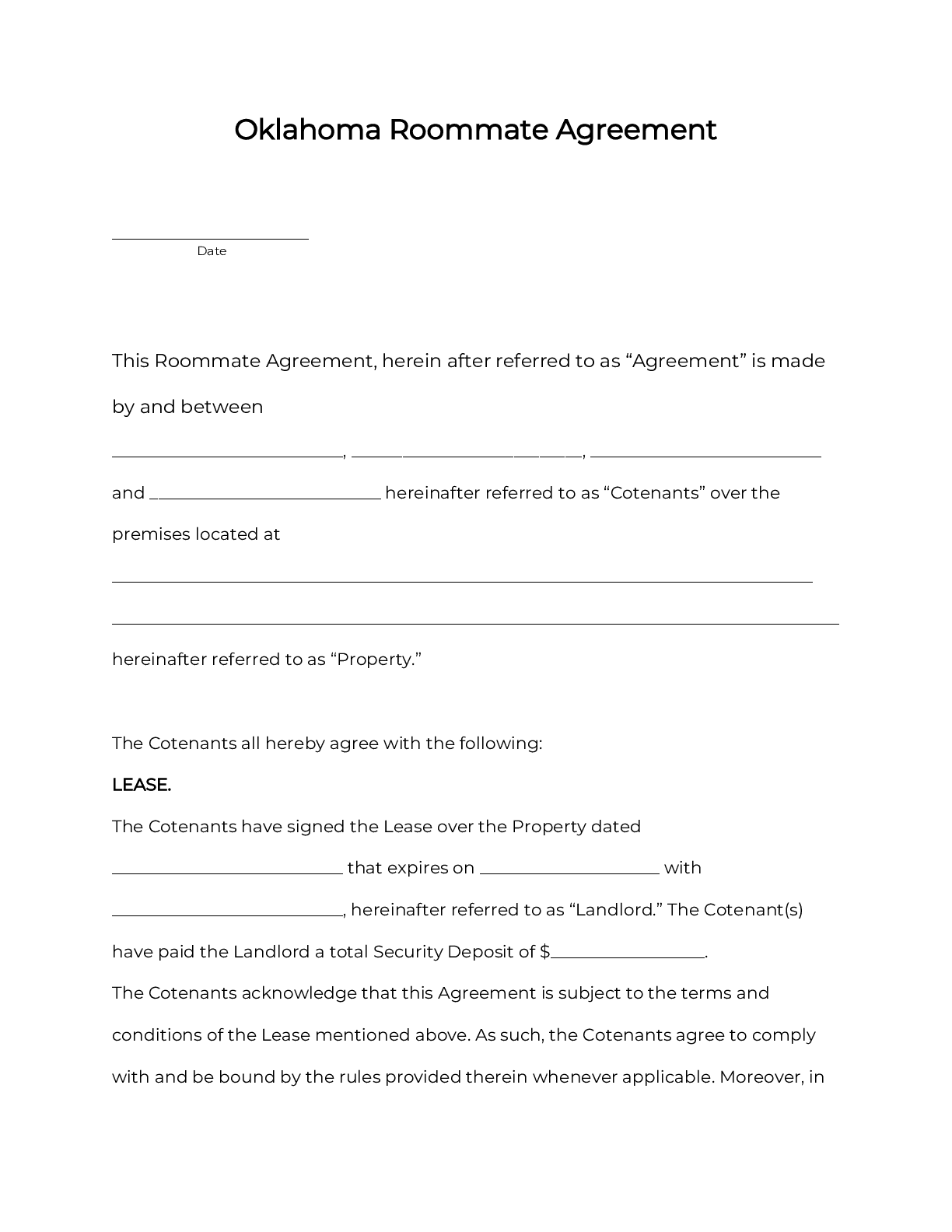An Oklahoma rental agreement is a legal contract between a landlord overseeing a rental property and a tenant using the property. Delaware landlord-tenant law governs and regulates these agreements.
Oklahoma Rental Agreement Types
An Oklahoma roommate agreement is a legal contract between two or more people (“co-tenants”) who share a rental property according to rules they set, including for things like splitting the rent. This agreement binds the co-tenants living together, and doesn’t include the landlord.
Common Rental Agreements in Oklahoma
- Oklahoma Real Estate Contract Form – This template is for members of the Oklahoma Real Estate Commission. It provides thorough rules and processes for most residential situations, including tenant responsibilities and flood insurance disclosures. There is also a slightly older version in circulation more suitable for situations where the landlord isn’t represented by a broker.
Oklahoma Required Residential Lease Disclosures
- Landlord’s Name and Address (required for all leases) – Oklahoma landlords must give the tenant their name and address, or that of their authorized agent. This allows required communication (for example, about repairs) to happen in a smooth way. Typically also includes extra contact information like phone numbers and email addresses.
- Flooding Disclosure (required for some leases) – Oklahoma landlords must include a notice when renting out any property that has experienced flooding in the past 5 years.
- Methamphetamine Contamination Disclosure (required for some leases) – Oklahoma prohibits the rental of properties with methamphetamine contamination levels above 0.1 micrograms per 100 square centimeters. The lease must disclose any known contamination.
- Lead-Based Paint Disclosure (required for some leases) – Landlords must provide an EPA-approved disclosure and informational pamphlet to tenants renting any property built before 1978.
To learn more about required disclosures in Oklahoma, click here.
Oklahoma Landlord Tenant Laws
- Warranty of Habitability – Oklahoma landlords can only rent out habitable property. This means providing certain basic health and safety features like heat, plumbing, and electricity. Landlords must repair any issues within 14 days of proper notice. Failure to repair lets a tenant terminate the lease, or repair and deduct from the rent. Oklahoma doesn’t let tenants withhold rent.
- Evictions – Oklahoma landlords may evict for rent default, lease violations, or illegal acts, among other things. Before filing eviction, landlords must serve tenants with prior notice to pay, comply, or quit, depending on the eviction type. This means most evictions in Oklahoma can take between five days to a few weeks. Properties covered by the federal CARES act are entitled to a minimum 30 days of notice before eviction, which can make the process much longer.
- Security Deposits – Oklahoma does not limit the amount of a security deposit. When a lease ends, the landlord must return any unused portion of a tenant’s deposit within 45 days.
- Lease Termination – Oklahoma lets month-to-month tenants end a lease in Oklahoma with 30 days of advance notice. Terminating a fixed-term lease usually requires active military duty, landlord harassment, uninhabitable property, or domestic abuse.
- Rent Increases and Fees – Oklahoma sets only “reasonable” expectations for the amount and timing of a rent increase. Late fees are as agreed by the lease. Oklahoma caps returned check fees at $25, for a landlord to recover indirectly through the Bogus Check Restitution Program.
- Landlord Entry – Oklahoma landlords may enter rental property for reasonable business purposes, like repairs and inspections. Except in emergencies, they must provide 24 hours of advance notice.
- Settling Legal Disputes – Oklahoma lets small claims courts hear landlord-tenant disputes, as long as the value in controversy is under $10,000. Unlike many states, Oklahoma allows eviction cases in small claims. The statute of limitations in Oklahoma is five years for written contracts and three years for oral contracts.
To learn more about landlord tenant laws in Oklahoma, click here.
Sources
- 1 Okla. Bar Ass'n Access To Justice Com'te, A Guide to Resources Available to Property Owners and Renters Under the CARES Act
-
CARES Act Section 4024(b) prohibits landlords of certain rental ‘covered dwellings’ from initiating eviction proceedings or “charg[ing] fees, penalties, or other charges” against a tenant for the nonpayment of rent. These protections extend for 120 days from enactment (March 27, 2020). Section 4024(c) requires landlords of the same properties to provide tenants at least 30 days-notice before they must vacate the property. (Quoting Congressional Research Service, CARES Act Eviction Moratorium, CRS Insight at 1 (April 7, 2020), https://crsreports.congress.gov/product/pdf/IN/IN1132)
Source Link - 2 Okla. Stat. tit. 22 § 114(A) & (B)
-
A. The district attorney may enter into a written restitution agreement with the defendant to defer prosecution on a false or bogus check for a period to be determined by the district attorney, not to exceed three (3) years, pending restitution being made to the victim of the bogus check as provided in this section.B. Each restitution agreement shall include a provision requiring the defendant to pay to the victim a Twenty-five Dollar ($25.00) fee and to the district attorney a fee equal to the amount which would have been assessed as court costs upon filing of the case in district court plus Twenty-five Dollars ($25.00) for each check covered by the restitution agreement; provided, every check in an amount of Fifty Dollars ($50.00) or more shall require a separate fee to be paid to the district attorney in an amount equal to the amount which would be assessed as court costs for the filing of a felony case in district court plus Twenty-five Dollars ($25.00). This money shall be deposited in a special fund with the county treasurer to be known as the “Bogus Check Restitution Program Fund”. This fund shall be used by the district attorney to defray any lawful expense of the district attorney’s office. The district attorney shall keep records of all monies deposited to and disbursed from this fund. The records of the fund shall be audited at the same time the records of county funds are audited.
Source Link




